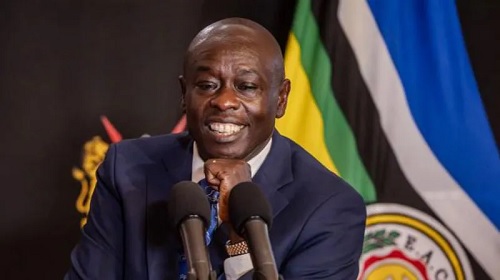Kenya's parliament has begun the final step to remove Deputy President Rigathi Gachagua from office.
An overwhelming majority voted in the National Assembly last week to approve his impeachment, setting the stage for the two-day trial in the Senate that decides whether or not to oust him.
The deputy president faces 11 charges including corruption, inciting ethnic divisions and undermining government - all of which he denies.
The row follows his recent fallout with President William Ruto, who has remained silent about the matter.
Gachagua’s trial is being conducted before the full house of the Senate after it abandoned a process to set up an 11-member committee to investigate the charges.
Proceedings have started and the charges are due to be read out followed by opening statements from both sides.
Analysts expect the deputy president's impeachment to be upheld as the ruling party senators are likely to be backed by those from the main opposition as happened when the the lower house voted on the case.
From 12:00 local time (09:00 GMT) on Wednesday, evidence by the National Assembly against Gachagua, including any witnesses, will be introduced and examined for three hours followed by another two hours of cross-examination.
On Thursday, the trial will resume to deal with the evidence and witnesses from Gachagua’s side until late afternoon.
At the conclusion of the process in the evening, senators will debate the motion for about two hours and then take a vote - scheduled to happen on Thursday night from 20:30 local time.
The Senate can decide to extend the process to Friday, the last day it can legally extend the matter.
At least two-thirds of the 67 Senate members must approve the motion for Gachagua to be removed from office.
Should that happen and his impeachment stands, he would be barred from ever holding public office.
He is expected to challenge the impeachment in the courts if it passes.
The deputy president has made numerous unsuccessful attempts to stop the impeachment process, with at least 26 court cases having been filed so far.
On Tuesday, a judge ruled that the court would not interfere and said the Senate should proceed with its constitutional mandate.
And just before the process began on Wednesday, a three-judge bench also declined a similar request.
Some of the grounds for Gachagua's impeachment include accusations that he acquired assets worth 5.2bn Kenyan shillings ($40m; £31m) in the two years since he became deputy president - allegedly acquired through corrupt means.
He has explained, including during his trial at the National Assembly, that most of the properties in question were from his late brother's estate.
The deputy president is a wealthy businessman from the vote-rich central Mount Kenya region.
In just five years, he rose from being a first-time MP to become the number two in Kenya's leadership, after Ruto picked him as his running mate in the August 2022 election.
At the time, he was battling corruption allegations in court which were later dropped after he came the deputy president.
His impeachment trial has dominated the discussions of many Kenyans and the media in recent weeks.
Some see the high political drama that the matter has elicited as a distraction from the economic concerns of the majority of Kenyans struggling with the high cost of living.
In June disgruntled Kenyans went to the streets in deadly protests that erupted over unpopular tax hikes, and which exposed a deep rift between Ruto and Gachagua.
Gachagua now stands accused of undermining the work of the security agencies in the wake of remarks he made at the time blaming the intelligence agency.

